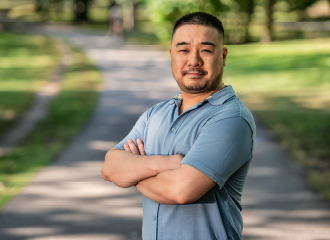Veteran Combats Isolation With Therapy and Community
3-minute read
Veteran Combats Isolation With Therapy and Community
3-minute read
Working 80-hour weeks as a combat correspondent for the Marine Corps took a toll on David, even contributing to a panic attack. “The day-to-day, it can build up inside a person,” the Marine Corps Veteran says. So when David finished his four years of service, he figured leaving the stressful environment would benefit his mental health.
What he didn’t anticipate was the isolation he would feel when he returned home. David was one of many Veterans who show signs of social withdrawal or social isolation while transitioning from military to civilian life or during other major life changes.
“You don’t necessarily have the friends that you did when you left,” David says of his situation. “That kind of network isn’t there anymore, so it’s easy to collapse into yourself a little bit and have to figure out how to start again.”
To find that new start, he would need some help.

Leveling Up: Veteran on Taking Ownership of His Healing
Looking for a new way forward
During his last year in service in 2014, after his panic attack, David started taking medication to treat his mental health conditions. He stopped when he transitioned back to civilian life. “One mindset was, I’m going to be leaving the stressful environment, so I should be in a better place,” David says.
Instead, he felt lonely and slipped back into depression. Some days, he struggled to get out of bed. “I would be in my bed for hours, just laying there, and kind of hate life, and yourself a little bit too,” he says.
David started to manage his symptoms through therapy and then began taking medication for major depressive disorder. He says he’s glad he did both. Describing the benefits of therapy, he says, “For me, it was mostly saying it out loud and then being accountable to a person, ’cause I’m not great about making and keeping promises to myself.”
“Mental health treatment is never a bad thing,” he says. “It’s always something you can build off of. … There’s a lot of things you might not know about yourself or keep locked up, not addressing. Therapy or anything like that can make you aware of those things, and I think that’s important.”
Finding new communities
Now, instead of spending hours in bed, David stays active and busy. “One of my hobbies is just having too many hobbies,” he says. “I like to try just to do a lot of different stuff.” That includes spending time alone fixing up his old car, a 1995 BMW. But he also makes sure to do things that allow him to connect with other people.
Sometimes making and maintaining those connections involves spending time outside with friends. And as an avid video game player, David joined a local video gaming community for Veterans. The organization, Frost Call, facilitates online conversations and in-person gaming events and community meetups.
“Community is definitely a great thing to have,” David says. “I love being with people and being able to help people.”
